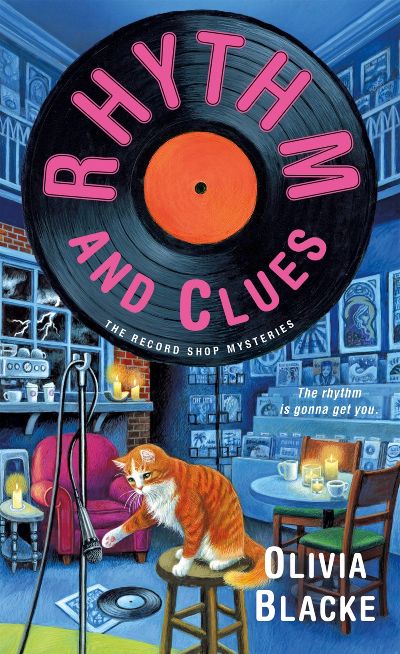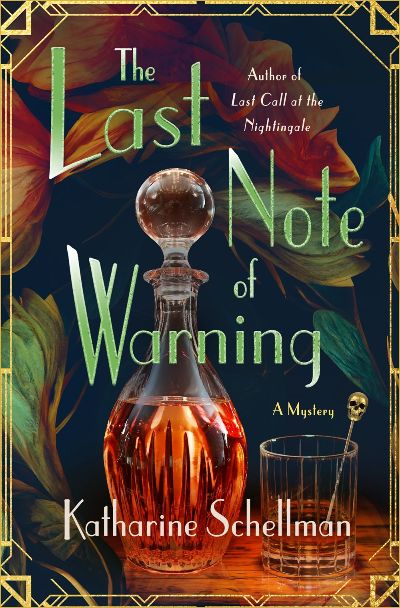Invincible is the adjective that comes most readily to mind when describing Maddy Montgomery, the hero in Valerie Burns’ Baker Street series. She’s relocated to the tiny, lake-front, Michigan town of New Bison, which is hundreds of miles from the closest Jimmy Choo boutique. Her nemesis in love has suddenly made an appearance, trashing Maddy all over social media. And while the bakery she inherited from her great-aunt is turning into a rip-roaring success, it attracts more dead bodies than the city morgue. Yes, there is a lot going on in this series, and we can’t forget the role of Baby, Maddy’s English Mastiff, who’s as expressive as any human. But one murder is rarely enough, and when a body washes ashore, it becomes clear that someone is out to suppress some important information. Once again Maddy needs to draw on the expertise of her great-aunt’s friends, the Baker Street Irregulars. This series has it all: fun, fashion, and friendship.
Women Sleuths
Taylor’s debut cozy hits all the beloved genre touchstones. There’s an offstage murder in a small town, baking, cats, a small business…cozy indeed! But the author adds a little spiciness to the relationships, making the book ideal for fans of the subgenre and those who love Taylor’s romantic-comedy What’s Not trilogy. The action takes place in Chatham Crossing, Massachusetts, where the self-proclaimed first lady is…well, that’s the subject of a friendly rivalry. Carole Duffy, the mayor’s wife, seems to have the most legal claim to the title. But if vivacity crowns the winner, the title would go to Venus Bixby, owner of a local vintage record and bake shop, Oldies and Goodies (home to cats Sonny and Cher and to Carole’s delicious cookies). Everyone who’s anyone is ready for Venus’s 50th birthday bash at the town’s big attraction, the Sofia Silva Whaling Museum, but the festivities grind to a halt when Venus falls over a distinct pair of orange platform shoes in the garden, shoes that are being worn by the dead owner of the museum’s gift shop. The sleuthing is on, with Venus, friends, and rivals excelling at small-town bitchiness even as suspects are ticked off the list. Watch for this fun first in a series, which comes with recipes and a playlist.
Perhaps only in New Orleans can there be a gay novice nun who is also a novice private detective and who offers up prayers like, “Hail Mary, share with me your divine vision, because I can’t see a fucking thing.” The nun in question is Sister Holiday, who teaches in a private school, runs a support group for survivors of Catholic Church sexual abuse, and on the side partners with a former cop to run Redemption Detective Agency. When the two hit the banks of the Mississippi to meet a new client, Holiday finds herself wading into the water to catch a body before it floats away. It’s her parish priest, and that awful discovery isn’t the last. Returning to school, the nun finds that another priest is missing. He seemed a kind young man, not one of the priests that Holiday loathes for their fake piety and fondness for their parishioners’ money. While a storm rages, Holiday must face the contradictions that are her life and life in New Orleans as well as help her brother and others face their demons, all while trying desperately to solve the mystery of the missing priest. Douaihy’s first in the series, Scorched Grace, was a New York Times Book Review Editors’ Choice, among other accolades. Fans of that book, as well as all who love an irreverent and smart lead, will happily join Sister Holiday for her second outing.
Many of us remember an early teacher fondly, and for Maggie Moore it’s Ms. Barker, the seventh-grade teacher who taught Maggie to diagram sentences. Maggie’s now studying forensic linguistics—the kind of analysis that allows researchers to determine if Shakespeare was the real author of a given work—and is by far the best student in the program. She’s thrilled when Professor Ditmire invites her to be his research assistant and recommends her to the local police, whose broke department can hire only a student to uncover the author of vicious notes that are being left at crime scenes. Maggie is glad of the work: she’s facing graduation soon with no job prospects, and more importantly to her, she might now be able to get the police to investigate the disappearance of her best friend years before, a case they never took seriously. Grammar lovers and anyone who likes a quirky protagonist—Maggie’s no stereotypical nerd, she’s a foulmouthed, tattooed diner waitress who drinks way too much—will find Maggie’s sentence-diagramming habit and her brilliant mind fascinating while following her to a linguistic triumph. Sands’s other books are true crime, and fans of that genre who want a fictional readalike can do no better than picking up Wordhunter.
Jane Austen’s throngs of fans will adore this series starter that introduces the writer as a lively amateur sleuth; a treasured member of a large, loving family; and as a woman of her time—feisty but too often kept from her potential. The marriage market among Jane’s circle looms large, of course, with Jane hoping for a proposal any day from a young Irishman while those around her assess one another in terms of their potential as financial insurance. When an alliance is about to be announced by a local family, their façade of gentility is threatened when a young woman is found murdered in their home. Jane recognizes her as a milliner she’s bought from lately. The local magistrate seems content to blame “gypsies” for the crime, an accusation Jane disputes as no traveling people have been seen in the area lately, but she’s soon sorry when another is accused: her mentally disabled brother, George. It’s now up to our literary hero to find the real killer and bring George home. The large cast of characters here keeps things lively; there’s often humor too, both in Jane’s wry comments throughout and in her witty letters to her sister about the case’s progression.
As always, Blacke (Vinyl Resting Place, 2022) does a fabulous job of keeping several balls in the air, from romances to murder, from seeking likely perpetrators to fighting off a pair of predatory investors. Small-town Cedar River, where gossip spreads like warm butter, provides the setting, while the three Jessup sisters—the youngest, Juni, is our narrator—are still struggling to keep their cafe/vinyl record store alive. When a crazy storm rips through town—this is Texas, after all—it washes out the roads, knocks out the electricity, and leaves a corpse in a parked car near their shop. He turns out to be one of the predatory investors—Juni knew him from college—who was hoping to make a deal with the sisters. But more importantly, with the town now isolated, where is the murderer hiding? The characters are wonderful, with Juni’s voice and sense of humor especially fresh, and the storyline is completely absorbing. A real treat for cozy fans.
Recently married, Lucy McNeil runs the Bodie Island Lighthouse Library. When a traveling art-history exhibit arrives in town, Lucy works with family and friends to create a unique display in the library that showcases local, national, and international artists. The morning after the library celebration, the librarian is surprised to discover one of the reproductions of a famous local artist is no longer on the wall. Who would want to steal a worthless copy of a famous painting? The grand opening of the exhibit leads to drama and the murder of one of the organizers, and the prime suspect for both the theft and the death is Tom Reilly, an art dealer with a shady past. Gates, who also writes mysteries under the name Vicki Delany (Deadly Summer Nights, 2021; Have yourself a Deadly Little Christmas, 2023), is a master of cozy settings and telling a compelling story. Her vast cast of characters is realistic, and the puzzle is challenging and surprising. While the actual lighthouse at Cape Hatteras does not have enough space for a library, readers will still want to visit. Whether this is the first dive or the eleventh, this series is a lot of fun.
Fans of Schellman’s previous two books in this exciting series, Last Call at the Nightingale (2022) and The Last Drop of Hemlock (2023), will find this trilogy closer a satisfying end to the roller coaster of Vivian Kelly’s life as a seamstress by day, flapper at a queer-friendly speakeasy by night. Vivian now delivers dresses to her boss’s wealthy clients, waiting around mansions until the clients deign to join her for a last check on their new dresses’ fit. On one such visit, Vivian is invited by the gentleman of the house to sit a while and warm up, during which time he’s called away. She then finds him dead, and as she’s the only person around, she’s on the hook for the killing. She’s given a week to find the real killer, with the police seemingly aware that she probably didn’t do the crime but happy to have a handy suspect to charge. The tumultuous week forms the bulk of the book, and sees our hero display her signature moxie, smarts, and the love she hides for her family and her police-officer paramour, their relationship troubled by his family ties to the commissioner who’s happy to put Vivian away. Life among the haves and have nots of the Roaring Twenties is a heady setting and Vivian a character well worth getting to know—you can enjoy this without having read the previous two books, but do yourself a favor and add them to your library’s hold list anyway!
What the world needs now is more Robert Thorogood and the three heroes of the Marlow Murder Club: Judith the crossword-puzzle author, Suzie the dogwalker, and Becks the vicar’s wife. This romp starts off with the Mayor keeling over at a planning meeting—lucky for us, Suzie happens to be attending—and the cause of death is soon determined to be poison in his coffee. Aconite, to be specific, the queen of all poisons. But who would kill the beloved Mayor? Before the ladies can begin their investigation, Tanika—a police officer in the earlier books and now detective inspector—appoints them as “civilian advisors,” a clear case of “if you can’t beat them, join them.” While traversing Marlow in search of the murderer is loads of fun, the real joy in this series is the dialog, wit, and friendships of the women. This is nothing less than the ultimate in cozies.
Mia Carina is living her best life, as the kids say. Her family’s catering hall in Queens, NY is both hugely successful and, with her acumen, now a fully legitimate business (the Family hasn’t always played above board). Shane, the love of her life, has finally proposed (Mia’s one tough lady, although when it comes to Shane, her knees get weak). But then she catches sight of a man who very much looks like Adam Grosso, her presumed-dead husband. Could she be wrong? Possibly, but a second sighting of the no-good SOB confirms he’s alive, which means Mia and Shane will have to delay their wedding—which they refuse to do. Mia calls an emergency meeting of family and Family—capisce?—to remove Adam, just not kill him (“My goal is to be a divorcee, not a widow. Ya got it?”). While finding Adam takes up a good chunk of the book, there are several fun subplots, not to mention an incredible cast of characters. Normally I’d worry about telling them apart, but DiRico manages to give each a strong identity, starting with our lead, Mia the Magnificent. Yes, it’s the fifth book in the series, but feel free to jump in. You won’t regret it.










